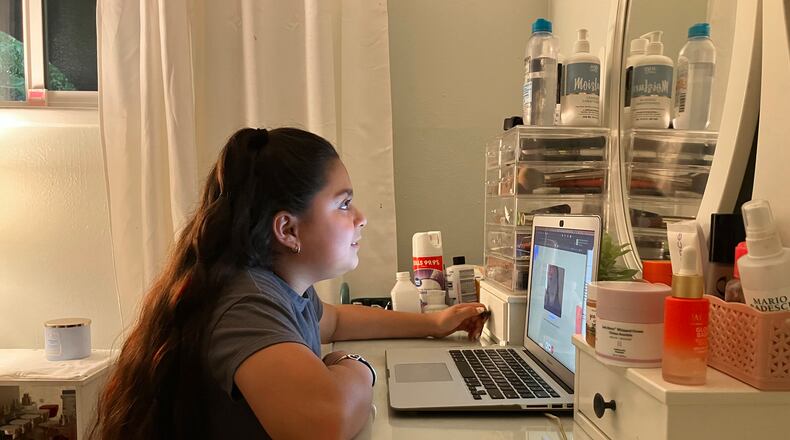Molly Castle Work
KFF Health News
What you should know
A Los Angeles public school health program is seeking to help overburdened schools cope with a surge in demand for mental health services. It will offer free mental health services to their 1.3 million K-12 students and promises to be a telling case study in both the efficacy of virtual therapy for students.
Los Angeles County public schools are rolling out an ambitious effort to offer free mental health services to their 1.3 million K-12 students, a key test of California Gov. Gavin Newsom’s sweeping, $4.7 billion program to address a youth mental health crisis.
Spearheaded by the county’s Medi-Cal plans — which provide health insurance to low-income residents — in collaboration with its Office of Education and Department of Mental Health, the LA school program relies on teletherapy services provided by Hazel Health, one of a clutch of companies that have sprung up to address a nationwide shortage of mental health services that grew much worse during the COVID-19 pandemic.
The teletherapy effort is one of four LA County projects that will collectively receive up to $83 million from the state’s Student Behavioral Health Incentive Program, one component of the Democratic governor’s “master plan” to address gaps in youth mental health care access.
LA’s Hazel Health contract is aimed at helping overburdened schools cope with a surge in demand for mental health services. It promises to be a telling case study in both the efficacy of virtual therapy for students and the ability of educators and administrators to effectively manage a sprawling and sensitive program in partnership with a for-profit company.
Results are promising
For some Los Angeles County educators and families, the initial results are promising.
Anjelah Salazar, 10, said her Hazel clinician has helped her feel a lot better. After the fifth-grader switched to a new school this year, Stanton Elementary in Glendora, she started having panic attacks every day.
Her mom, Rosanna Chavira, said she didn’t know what to do — even though she’s a clinical coordinator for a company that treats mental health conditions — and worried she wouldn’t be able to find an affordable therapist who accepted their insurance. Once Chavira learned about Hazel, she jumped at the opportunity.
“This being free and having a licensed professional teaching her coping skills, it just means the world,” Chavira said. “You can already see changes.”
Salazar said she’s met with her virtual therapist five times so far. One coping technique that she especially appreciates is a tapping exercise: Every night before bed, she taps her eyes, her cheeks, her chest, and her knees. With each tap, she recites the same affirmation: “I am brave.”
Christine Crone, parent of seventh grader Brady, said she has yet to see if the sessions have been effective for her son, who attends Arroyo Seco Junior High in Santa Clarita, but she knows he enjoys them.
“He struggles normally with being on time and prepared, but with these sessions, he always stops what he is doing and makes sure he is logged in on time,” Crone said. “He says that his therapist is nice, fun, and easy to talk to.”
Jennifer Moya, a mental health counselor at Martha Baldwin Elementary in Alhambra, a city east of Los Angeles, said her students like the flexibility of teletherapy, which allows them to meet with clinicians anytime between 7 a.m. and 7 p.m.
“This generation of kids has grown up digital,” said Moya, who is in charge of referring students to Hazel at her school. “They love that this is easy.”
State relies on for-profit ventures
Teletherapy is playing an increasingly important role in schools across the nation as educators and social workers face pressure to address growing mental health issues. According to an April Chalkbeat report, 13 of the nation’s 20 largest school districts, including Los Angeles Unified, have added teletherapy since the pandemic began.
LA County’s deal with Hazel calls for the company to be paid up to $20 million through the end of 2024. In addition, Hazel can bill students’ insurance.
The San Francisco-based company, founded in 2015, has raised $112.5 million from investors and has contracts in 15 different states. Other companies chasing youth mental health dollars include another San Francisco startup, Daybreak Health, a graduate of the prestigious Y Combinator tech incubator, along with BeMe, Brightline, and Kooth.
California chose Brightline and Kooth for a 2024 $532 million statewide initiative on virtual youth behavioral services, another important component of Newsom’s master plan. There is some overlap between the state and local programs, Brightline co-founder and CEO Naomi Allen acknowledged, but she said the Brightline offering is broader than what Hazel is doing in schools, with services including everything from coaching sessions for caregivers to meditation resources.
“The state is funding free access to services for every child in the state, which is just a remarkably ambitious program,” said Allen.
The contract with Hazel ends in December 2024, but Garoupa said the Office of Education and its partners intend to maintain services through June 2025. Any extension beyond that will depend on the results.
Sonya Smith with the Office of Education said the office will be continuously evaluating Hazel’s effectiveness through an annual survey, monthly impact reports, and weekly meetings.
“The number of students that are using Hazel is obviously going to be a key metric,” Smith said. “Hazel’s historic utilization rate is 3% to 8%. We’ll be evaluating if those numbers hold up, if students are accessing care in a timely manner, and if it’s lightening the burden for school staff and community-based providers.”
About the Solutions Journalism Network
This story is republished through our partner, the Solutions Journalism Network, a nonprofit organization dedicated to rigorous reporting about social issues.
Credit: TNS
Credit: TNS
Credit: TNS
Credit: TNS
About the Author






